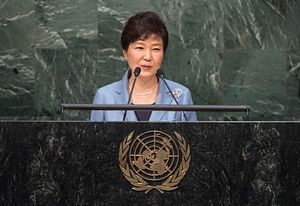President Park Geun-hye of South Korea, speaking at the United Nations General Assembly debate yesterday, cited the Iran nuclear deal completed this summer in urging the international community to focus on resolving the North Korean nuclear issue. In addition, she highlighted the need for regional cooperation in northeast Asia.
Park called on the UN to accord the North Korean nuclear issue the highest priority, “if we are to uphold the integrity of the international nuclear non-proliferation regime and live up to the aspirations of humanity for a world without nuclear weapons.” North Korea, Park said, is “the last remaining non-proliferation challenge.” Park did not really comment on the specifics of the Iranian nuclear deal, saying only that a deal was reached and that North Korea should be the focus now. North Korea, for its part, has said it holds no interest in an Iran-style negotiations.
Park went on to state that North Korea’s recent provocations undermine efforts to restart six-party talks on denuclearization. In August, two South Korean soldiers were injured by North Korean landmines in the DMZ. In response, South Korea restarted broadcasting propaganda via loudspeakers along the border. Tensions culminated in an exchange of shells. On August 25, the two sides deescalated, meeting in Panmunjom for three days and coming away with an agreement in which North Korea expressed “regret” (but did not “apologize”) for the injured South Korean soldiers and the South stopped the broadcasts.
At the UN, Park advised North Korea to “choose reform and opening rather than additional provocations and to endeavor to free its people from hardship. Pushing ahead with provocations, including its nuclear development program, will undermine the values of humanity’s peace espoused by the international community and the UN have been espousing.”
In mid-September, North Korean state media confirmed that the country had restarted operations at the Yongbyon nuclear complex, which had been shuttered in 2007 as part of denuclearization talks. In 2013, as John Power wrote in The Diplomat recently, “Pyongyang declared its intention to restart the facility.” But, Power noted, most experts seems to agree that there are huge unknowns with regard to North Korea’s actual nuclear capabilities.
The division of the Korean peninsula, Park said, is the “the last remaining vestige of the Cold War.”
Park, throughout her speech, made it clear that South Korea is interested in both regional and global integration. She mentioned UN Secretary-General Ban Ki-moon’s description of northeast Asia as a “crucial missing link,” without any regional cooperation mechanism. Despite the Northeast Asia Peace and Cooperation Initiative (NAPCI) Park pushed, in which regional states discuss cooperation on nuclear security, disaster management and health, North Korea plays a spoiler. This was illustrated by Park with the sad story of the Eurasia Friendship Express — a rail journey organized by South Korea from the peninsula across Asia to Europe — which can’t pass through North Korean territory.
The message is clear: North Korea remains the rock in northeast Asia’s shoe. But Park leaves the door somewhat open, even if Kim Jong-un isn’t interested in walking through it.
“Should the DPRK boldly give up its nuclear ambitions and choose the path towards openness and cooperation,” Park said, “the Republic of Korea will work with the international community to actively support North Korea in developing its economy and improving the quality of life of its people.”
































